When hiring a UAV cinematographer for your sports event, start by verifying their FAA certification and insurance coverage. Evaluate their sports-specific experience and review their aerial footage portfolio. Assess their equipment quality and capabilities to guarantee they can capture high-quality shots. Don't overlook communication skills and teamwork ability, as they'll need to coordinate with ground crews. Check their post-production editing abilities for polished final products. Understand their pricing structure and package options, and always request client references. By considering these factors, you'll be well-equipped to choose a skilled professional who can elevate your event's coverage to new heights.
Key Takeaways
- Verify FAA Part 107 certification and ensure comprehensive drone insurance coverage of at least $1 million.
- Evaluate the cinematographer's portfolio for diverse sports event experience and high-quality aerial footage.
- Assess equipment quality, including drone specifications, camera resolution, and backup gear for continuous coverage.
- Check safety protocols, including pre-flight checklists, emergency procedures, and familiarity with local regulations.
- Review post-production skills, including editing abilities, storytelling techniques, and capacity to incorporate feedback.
Check FAA Certification
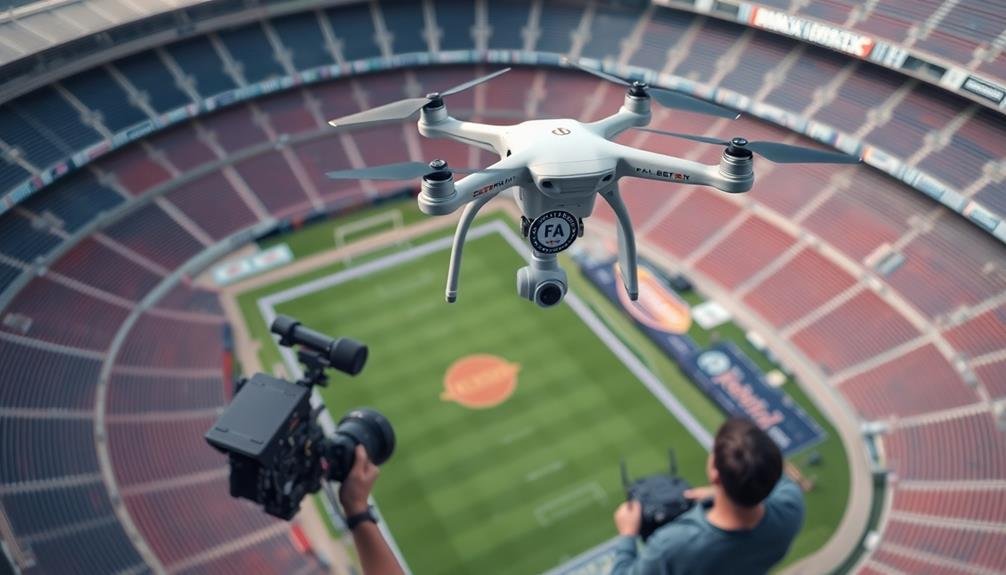
Verifying FAA certification is essential when hiring UAV cinematographers for sports events.
You'll want to confirm that the operator holds a valid Part 107 Remote Pilot Certificate from the Federal Aviation Administration. This certification demonstrates that the pilot understands airspace regulations, weather patterns, and safe operating procedures for unmanned aircraft systems.
Ask to see their certificate and check its expiration date. Certified pilots must renew their credentials every 24 months.
Additionally, inquire about their experience with sports event filming and their knowledge of specific regulations for flying drones at sporting venues.
Don't forget to check that the cinematographer has appropriate insurance coverage. This should include liability insurance for potential damage or injuries caused by drone operations.
It's also wise to ask about their safety protocols and emergency procedures.
Lastly, discuss any local restrictions or permits required for drone use at your event location. A professional UAV operator should be familiar with these requirements and able to obtain necessary permissions.
Evaluate Experience in Sports Coverage
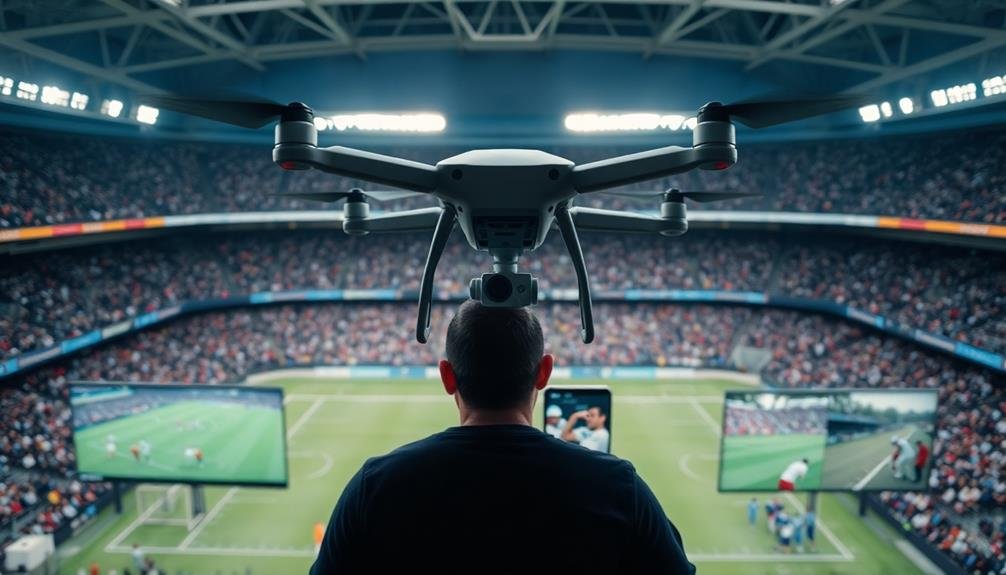
When it comes to evaluating a UAV cinematographer's experience in sports coverage, you'll want to dig deep into their portfolio. Look for a diverse range of sports events they've covered, as different sports require unique filming techniques and strategies.
Pay attention to the quality of their aerial footage, including smooth camera movements, dynamic angles, and the ability to capture key moments in fast-paced actions.
Ask for specific examples of their work in sports similar to your event. An experienced sports UAV cinematographer should be able to demonstrate:
- Knowledge of sport-specific rules and gameplay to anticipate key moments
- Ability to work seamlessly with ground camera crews and production teams
- Experience in adhering to event-specific regulations and safety protocols
Don't hesitate to inquire about their equipment and technical capabilities. Skilled operators should be familiar with various drone models and camera setups suitable for different sports environments.
They should also be able to explain their approach to capturing engaging footage while maintaining safety standards. By thoroughly evaluating their sports coverage experience, you'll guarantee you're hiring a UAV cinematographer who can deliver high-quality aerial footage that enhances your event's coverage.
Review Portfolio of Aerial Footage
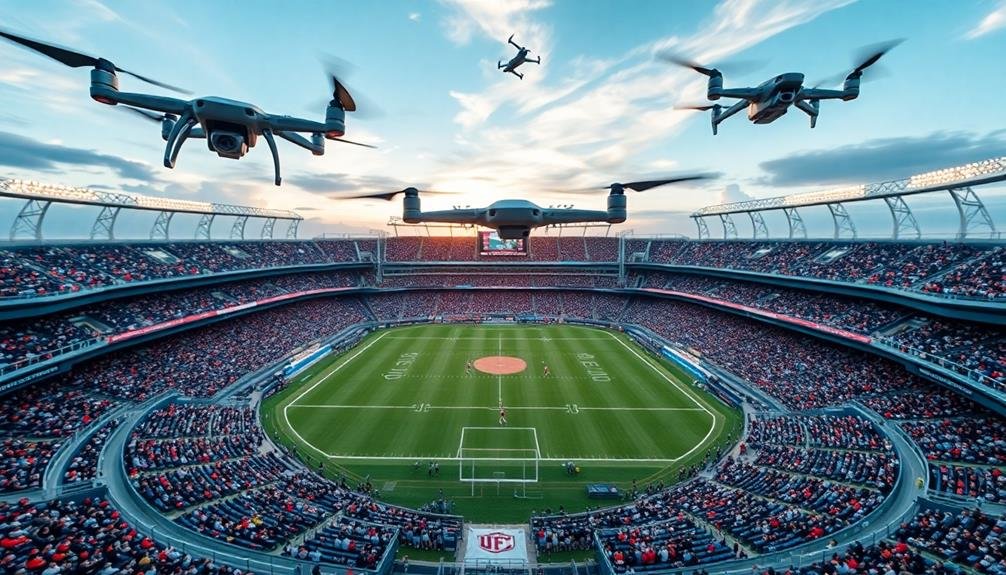
When reviewing a UAV cinematographer's portfolio, you'll want to examine the range of shots they've captured.
Look for variety in angles, distances, and movements that showcase their ability to capture dynamic sports action.
Pay attention to their editing techniques and how they've pieced together footage to tell compelling stories, while also checking for expertise in filming specific sports relevant to your event.
Assess Shot Variety
A crucial step in evaluating potential UAV cinematographers is reviewing their portfolio of aerial footage. As you examine their work, pay close attention to the variety of shots they've captured. A skilled drone operator should demonstrate proficiency in multiple shot types, angles, and movements.
Look for diversity in their portfolio, including:
- Wide establishing shots that capture the entire venue or event
- Dynamic follow shots that track athletes or action sequences
- Dramatic reveal shots that slowly uncover the scene
Evaluate the cinematographer's ability to execute different flight patterns, such as orbits, sweeps, and vertical ascents. These movements add depth and visual interest to sports coverage.
Don't forget to review their mastery of cinematic techniques like slow motion, time-lapse, and hyperlapse.
Consider how well they've adapted their shooting style to various sports and environments. A versatile UAV operator should showcase footage from both indoor and outdoor venues, as well as different lighting conditions.
Evaluate Editing Techniques
Beyond shot variety, it's crucial to evaluate a UAV cinematographer's editing skills. When reviewing their portfolio, pay close attention to how they've pieced together their aerial footage. Look for smooth shifts between shots, coherent storytelling, and a good sense of pacing. The best editors can create a compelling narrative that captures the excitement of sports events.
Check if they've incorporated appropriate music and sound effects to enhance the viewing experience. A skilled editor will synchronize audio elements with the visuals to create a more immersive final product. Assess their color grading techniques as well. The footage should have consistent and appealing color tones that complement the sport and venue.
Examine how they've integrated on-screen graphics or text overlays. These elements should be informative yet unobtrusive, enhancing the viewer's understanding of the event. Pay attention to their use of slow-motion or speed ramping effects, which can add drama to key moments.
Check Sports-Specific Expertise
Reviewing a UAV cinematographer's portfolio of aerial footage is essential for evaluating their sports-specific expertise. When examining their work, pay close attention to how well they capture the dynamics of different sports events. Look for smooth tracking shots that follow athletes, creative angles that showcase the venue, and dynamic shifts that maintain the excitement of the action.
Consider these key aspects when evaluating their sports-specific expertise:
- Variety of sports covered: Verify they've experience with multiple sports, as each requires different filming techniques and understanding of game flow.
- Ability to capture pivotal moments: Check if they can anticipate and frame significant plays or highlights that define a sporting event.
- Understanding of sport-specific regulations: Verify their knowledge of drone flight restrictions and safety protocols for various sports venues.
Don't hesitate to ask for specific examples of their work in the sport you're hiring for. If they lack direct experience in your particular sport, evaluate their adaptability based on similar fast-paced events they've covered.
Assess Equipment Quality and Capabilities
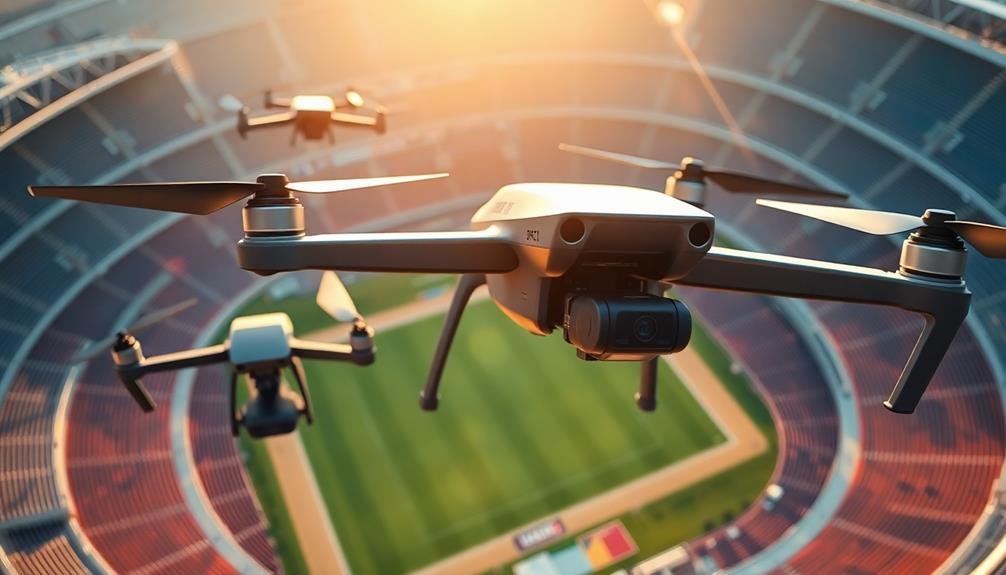
When evaluating UAV cinematographers for sports events, you'll need to appraise their equipment quality and capabilities.
Start by examining the drone specifications and features, including stability, maneuverability, and obstacle avoidance systems.
Next, check the camera resolution and quality to guarantee crisp, high-definition footage, and consider the drone's flight time and range to ensure full coverage of your event.
Drone Specifications and Features
Evaluating the quality and capabilities of a cinematographer's drone equipment is vital when hiring for sports events. You'll want to guarantee their drones can capture high-quality footage and perform reliably in various conditions.
Pay close attention to the drone's camera specifications, including resolution, frame rates, and low-light performance. Look for 4K or higher resolution and at least 60fps capability for smooth slow-motion shots.
Consider the drone's flight time and range, as longer-lasting batteries and extended control distances allow for more extensive coverage of sporting events. Stability features like gimbal systems and obstacle avoidance technology are essential for capturing steady footage and guaranteeing safe operation in crowded venues.
When evaluating a cinematographer's drone equipment, focus on these key features:
- Camera quality (resolution, frame rates, sensor size)
- Flight performance (battery life, range, top speed)
- Intelligent flight modes (tracking, waypoints, panoramas)
Don't forget to inquire about backup equipment and redundancy systems. A professional UAV cinematographer should have multiple drones and spare parts to handle any technical issues that may arise during your sports event.
Camera Resolution and Quality
Camera resolution and quality are paramount when evaluating a UAV cinematographer's equipment for sports events. You'll want to verify they're using high-resolution cameras capable of capturing crisp, detailed footage. Look for cinematographers who use cameras with at least 4K resolution, though 6K or 8K is even better for capturing fast-paced sports action.
Consider the camera's frame rate capabilities, as higher frame rates allow for smooth slow-motion replays. A minimum of 60 fps is essential, but 120 fps or higher is ideal for sports events. Don't forget about low-light performance, as many events may occur in challenging lighting conditions.
Here's a quick reference guide for camera specifications:
| Resolution | Frame Rate | Low-Light Performance |
|---|---|---|
| 4K | 60 fps | Good |
| 6K | 120 fps | Better |
| 8K | 240 fps | Best |
Ask about the camera's dynamic range and color depth, as these factors contribute to the overall image quality. A wider dynamic range helps capture details in both bright and dark areas, while higher color depth ensures more accurate and vibrant colors. Additionally, inquire about the drone's gimbal stability, as this directly affects the smoothness of the footage.
Flight Time and Range
Two critical factors to analyze when contemplating a UAV cinematographer's equipment are flight time and range.
These aspects directly impact the drone's ability to capture extensive footage and cover large areas during sports events. You'll want to verify the cinematographer's equipment can handle the demands of your specific event.
When evaluating flight time, consider the duration of your sports event and the need for continuous coverage. Most professional drones offer 20-30 minutes of flight time per battery, but experienced operators will have multiple batteries on hand for quick swaps.
Range is equally important, especially for events covering expansive areas like marathons or cycling races.
To gauge the adequacy of a cinematographer's equipment, ask these questions:
- What's the maximum flight time of your drone, and how many spare batteries do you carry?
- What's the operational range of your drone, and how does it maintain signal strength?
- Do you have any long-range capabilities or relay systems for extended coverage?
Verify Insurance and Liability Coverage
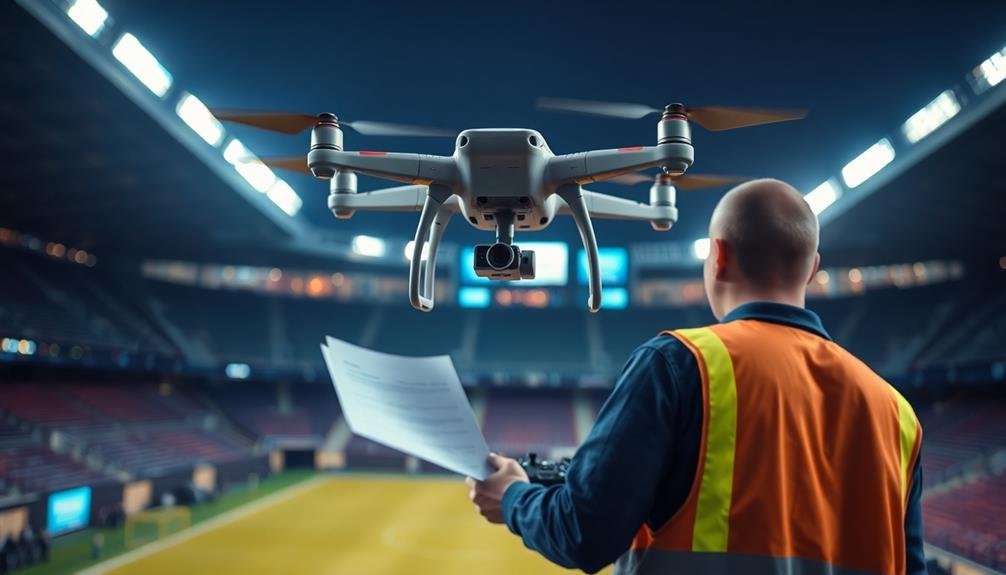
Safeguard your event by confirming proper insurance and liability coverage for UAV cinematographers. Ask potential hires to provide proof of extensive drone insurance, including both liability and equipment coverage. Verify that their policy specifically covers commercial drone operations for sports events.
Check that the coverage limits meet your event's requirements, typically a minimum of $1 million in liability insurance. Some venues or organizations may require higher limits, so confirm these details beforehand. Confirm the policy includes coverage for property damage, bodily injury, and personal injury.
Request to be added as an additional insured on the cinematographer's policy for the duration of your event. This protects you from potential claims arising from their drone operations. Verify that the policy doesn't have exclusions that could leave you exposed, such as altitude restrictions or specific aircraft types.
Ask for the cinematographer's FAA Part 107 certification and any waivers they've obtained for operations like flying over people or at night. These documents demonstrate their commitment to legal compliance and safety.
Discuss Safety Protocols and Procedures
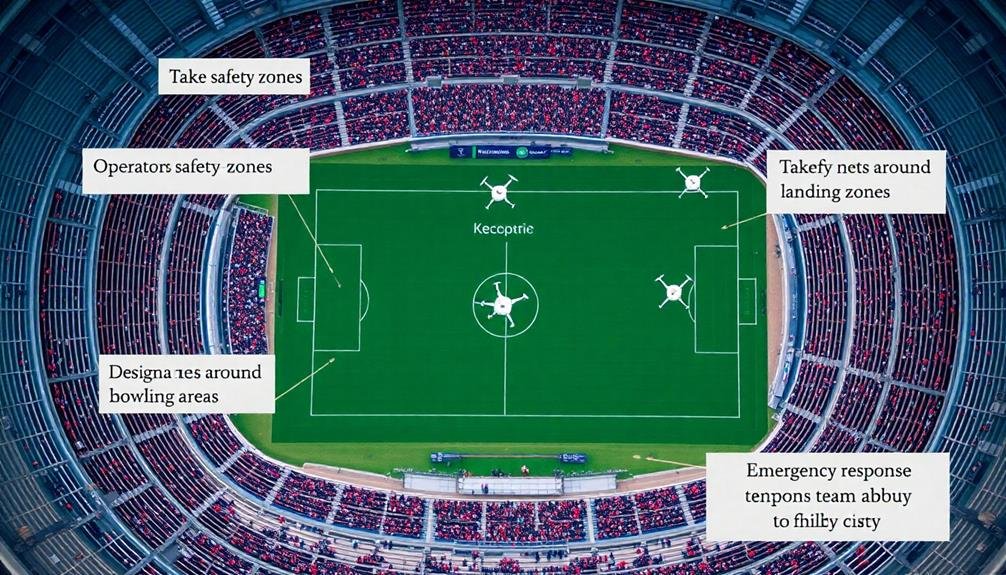
With insurance and liability matters settled, it's time to address the critical safety aspects of drone cinematography at your sports event. Discuss safety protocols and procedures with your chosen UAV cinematographer to guarantee a secure filming environment.
Ask about their pre-flight checklists, emergency response plans, and communication systems with ground crew members.
Request a detailed safety plan that outlines:
- No-fly zones and geofencing to prevent the drone from entering restricted areas
- Procedures for managing spectator safety, including designated takeoff and landing zones
- Weather condition limits and protocols for aborting flights when necessary
Ascertain the cinematographer is familiar with local regulations and has obtained any required permits for flying in your event's location.
Discuss their approach to maintaining visual line of sight with the drone at all times and how they'll handle potential signal interference in crowded venues.
Ask about their experience flying in similar environments and any specific safety measures they employ for sports events.
Consider Communication and Teamwork Skills
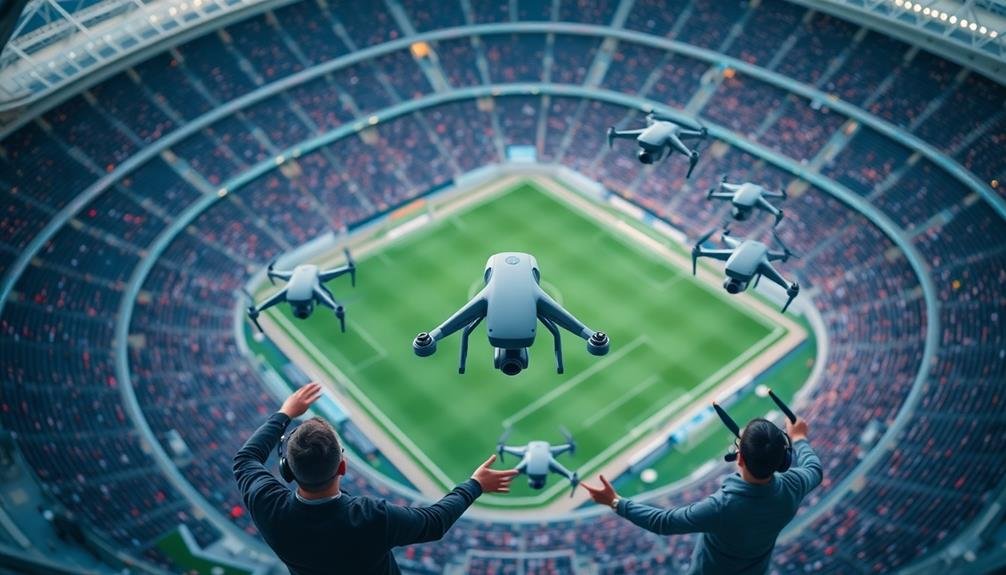
When hiring UAV cinematographers for sports events, you'll want to assess their communication and teamwork skills.
Look for candidates who can effectively coordinate with ground crews, referees, and other event staff on-site.
You'll also need operators who can clearly brief their team on flight plans, safety procedures, and shot requirements before each event.
Effective On-Site Coordination
Effective on-site coordination is essential for successful sports event UAV cinematography. When hiring UAV operators, guarantee they can work seamlessly with your existing team and event organizers. Look for professionals who demonstrate clear communication skills and the ability to adapt to fast-paced environments.
During the event, your UAV cinematographers should be able to:
- Coordinate with ground camera operators to avoid interference and capture complementary shots
- Respond quickly to changing weather conditions or unexpected event developments
- Maintain constant communication with event officials and safety personnel
You'll want operators who can efficiently set up and break down their equipment without disrupting other activities. They should also be able to brief your team on safety protocols and no-fly zones before the event begins.
Consider conducting a pre-event walkthrough with your UAV operators to familiarize them with the venue layout and discuss potential challenges. This will help guarantee smooth operations on the day of the event.
Clear Briefing Abilities
Clear briefing abilities are a cornerstone of successful UAV cinematography for sports events. When hiring UAV operators, you'll want to guarantee they can effectively communicate their plans, intentions, and any potential issues to your team.
Look for candidates who can articulate complex flight paths and shot compositions in simple terms. They should be able to explain technical aspects of their equipment and how it'll be used to capture the desired footage.
During the interview process, ask potential hires to walk you through a hypothetical event setup. Pay attention to how well they break down their approach and whether they can adapt their explanations to suit different team members' levels of technical understanding.
A skilled UAV cinematographer should be able to brief both fellow camera operators and event organizers with equal clarity.
You'll also want to assess their ability to receive and incorporate feedback. Can they quickly adjust their plans based on new information or last-minute changes?
Look for candidates who demonstrate active listening skills and show a willingness to collaborate with your existing team. Their clear briefing abilities will be essential in guaranteeing smooth operations and capturing the best possible footage of your sports events.
Evaluate Post-Production Editing Abilities
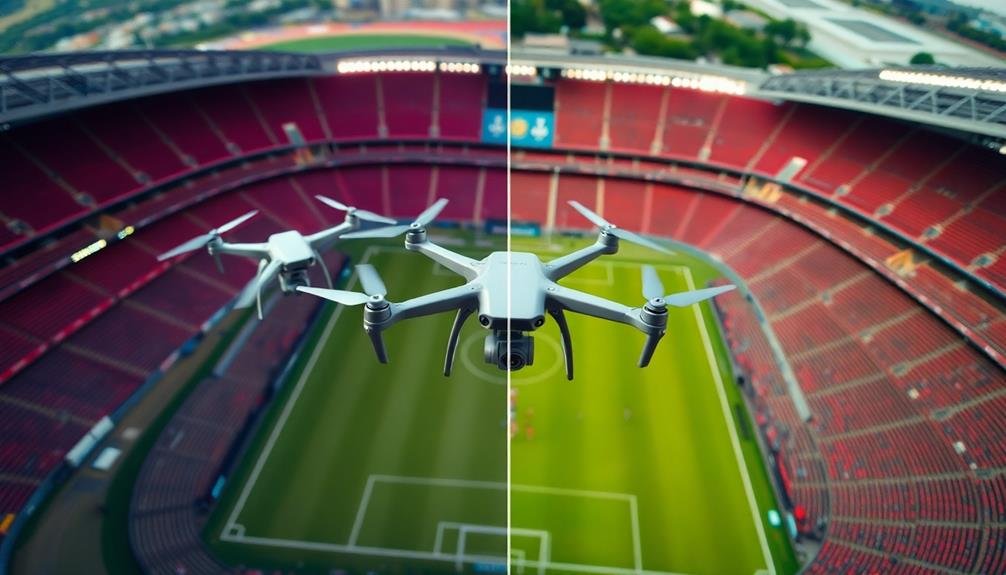
Evaluating a UAV cinematographer's post-production editing skills is essential for delivering polished sports event footage. When reviewing their abilities, you'll want to go through their portfolio and ask for samples of their edited work. Pay close attention to the quality of changes, color grading, and overall storytelling in their finished products.
To thoroughly evaluate a candidate's post-production skills, consider the following:
- Technical proficiency: Check if they're adept with industry-standard editing software like Adobe Premiere Pro, Final Cut Pro, or DaVinci Resolve. Their familiarity with these tools will impact their efficiency and the quality of their output.
- Creative vision: Review their ability to craft compelling narratives from raw footage. Look for evidence of dynamic pacing, engaging visual sequences, and effective use of music and sound design.
- Attention to detail: Examine their work for clean cuts, smooth changes, and proper audio balancing. These elements are vital for creating a professional-looking final product.
Don't hesitate to ask candidates about their post-production workflow and how they handle challenges like tight deadlines or client revisions. Their responses will give you insight into their problem-solving skills and adaptability, which are valuable assets in the fast-paced world of sports event cinematography.
Understand Pricing and Package Options
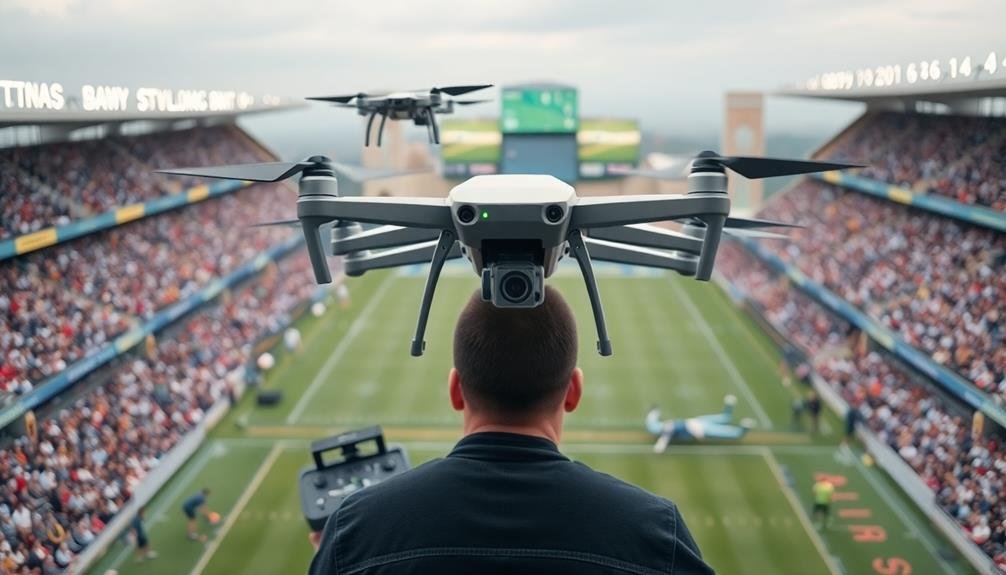
A UAV cinematographer's pricing structure and package options can vary widely, so it's vital to understand what you're getting for your money. Ask for detailed breakdowns of their offerings, including flight time, editing hours, and deliverables. Many professionals offer tiered packages, ranging from basic coverage to thorough event documentation.
When comparing prices, consider the equipment quality, insurance coverage, and the cinematographer's experience level. Don't automatically opt for the cheapest option, as quality and reliability are important for sports event footage. Inquire about any additional costs, such as travel expenses or extra editing time.
Some cinematographers may offer customizable packages to fit your specific needs and budget. Don't hesitate to negotiate or request modifications to their standard offerings. Ask about discounts for multiple events or longer-term contracts if you're planning a series of sports events.
Be clear about your expectations and confirm they're reflected in the pricing. Request sample contracts and review them carefully before committing.
Request Client References and Testimonials
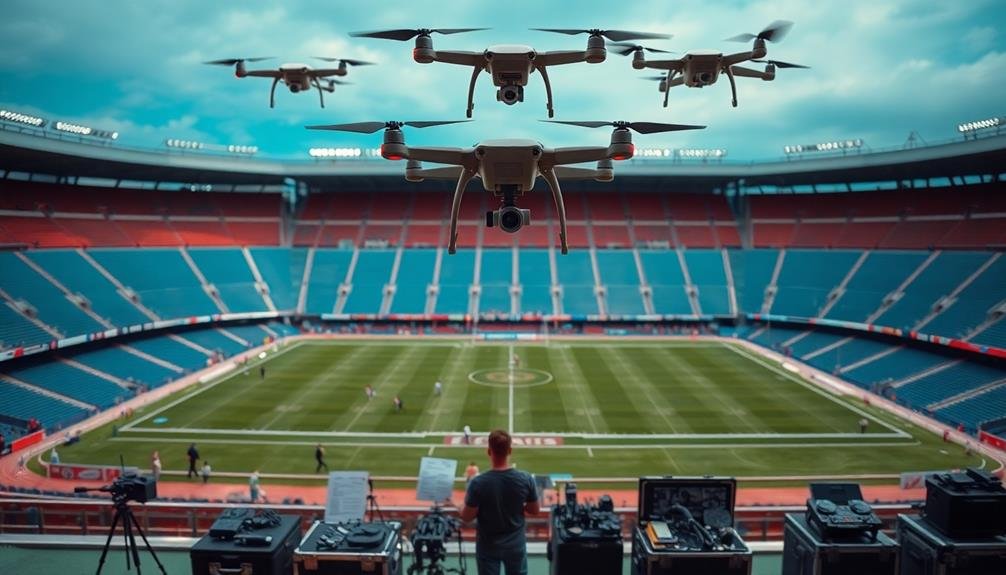
Once you've got a handle on pricing, it's time to assess the quality of potential UAV cinematographers. Requesting client references and testimonials is essential in making an informed decision. Don't hesitate to ask for examples of their previous work, especially footage from sports events similar to yours. This will give you a clear idea of their capabilities and style.
When reaching out to references, ask specific questions about the cinematographer's performance:
- How well did they communicate before, during, and after the event?
- Were they punctual and professional throughout the process?
- Did the final product meet or exceed expectations?
Pay attention to both positive and negative feedback, as it'll help you form a thorough picture of the cinematographer's strengths and weaknesses.
Look for testimonials on their website or social media platforms, but don't rely solely on these. Direct conversations with past clients can provide valuable insights that may not be apparent in written reviews.
Frequently Asked Questions
How Early Should I Book a UAV Cinematographer for a Sports Event?
You should book a UAV cinematographer at least 2-3 months before your sports event. This gives you time to review their portfolio, discuss your vision, and allows them to plan for any necessary permits or equipment.
Can UAV Footage Be Integrated With Traditional Broadcast Cameras During Live Events?
Yes, you can integrate UAV footage with traditional broadcast cameras during live events. You'll need specialized equipment and skilled operators to seamlessly blend aerial shots into your live feed. It's becoming increasingly common in sports broadcasting.
What Weather Conditions Are Unsuitable for UAV Cinematography at Sports Events?
You shouldn't fly UAVs in heavy rain, strong winds, or extreme temperatures. Lightning storms are a no-go. Fog, snow, and high humidity can also cause problems. Always check local weather reports before planning drone cinematography for sports events.
Are There Specific Drone Models Recommended for Different Types of Sports Events?
You'll find different drones suit various sports events. For outdoor events, use DJI Inspire 2 or Mavic 3 Pro. For indoor events, consider smaller models like DJI Mini 3 Pro or Autel EVO Nano+. Always check local regulations.
How Long Does It Typically Take to Receive Edited Footage After an Event?
You'll typically receive edited drone footage within 1-3 days after the event. However, it can vary depending on the complexity of the project and the cinematographer's workload. Don't hesitate to discuss turnaround times before booking.
In Summary
You've now got the tools to hire exceptional UAV cinematographers for your sports events. Remember, it's not just about their flying skills. Look for a well-rounded professional who's certified, experienced, and equipped with the right gear. Don't forget to check their post-production abilities and references. By following these tips, you'll find a drone operator who can capture stunning aerial footage that'll elevate your sports coverage to new heights.
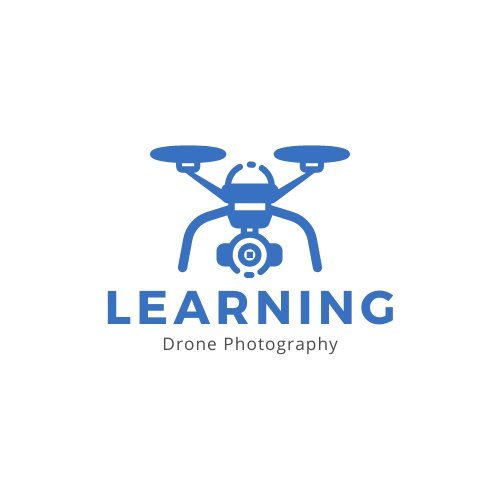
As educators and advocates for responsible drone use, we’re committed to sharing our knowledge and expertise with aspiring aerial photographers.
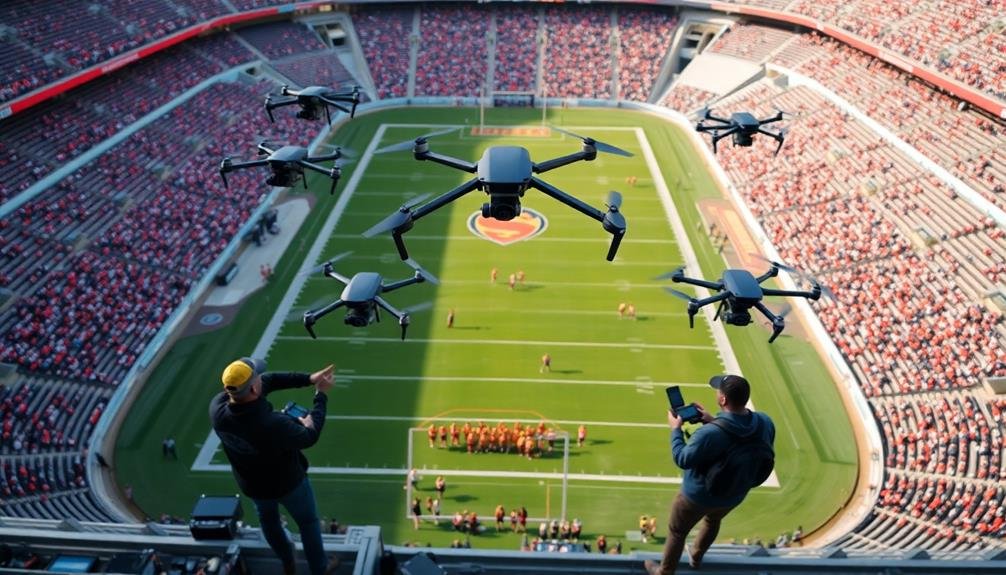
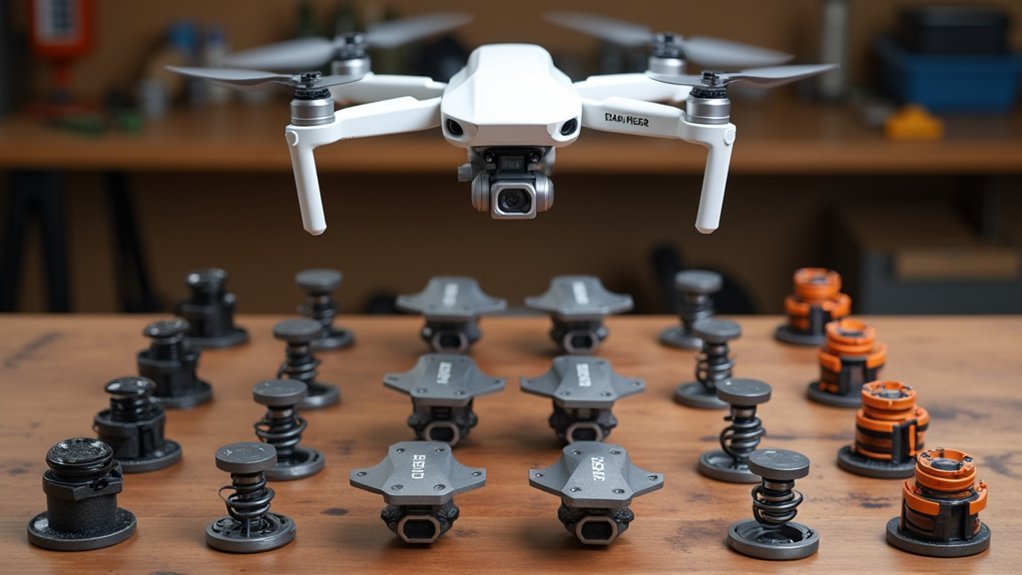
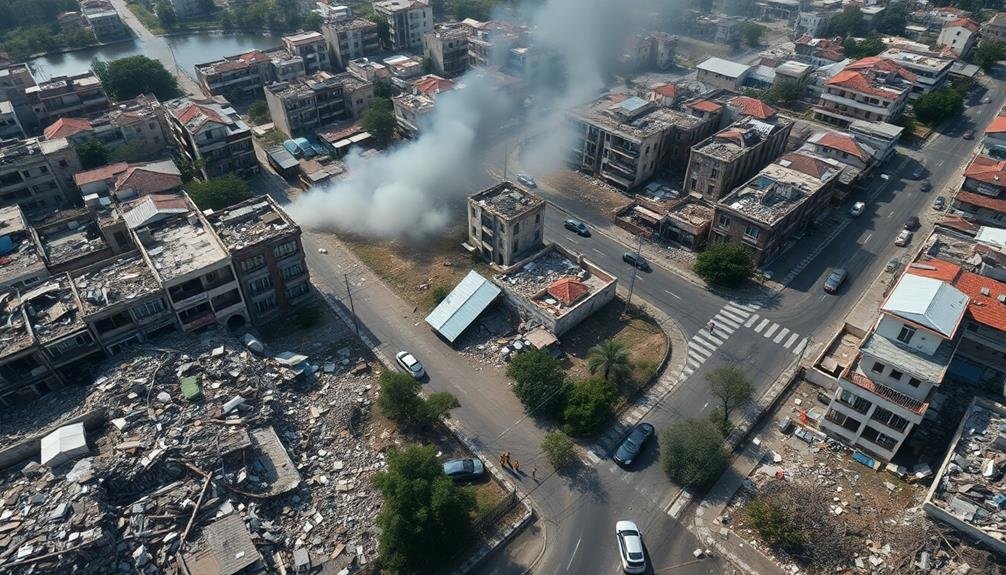
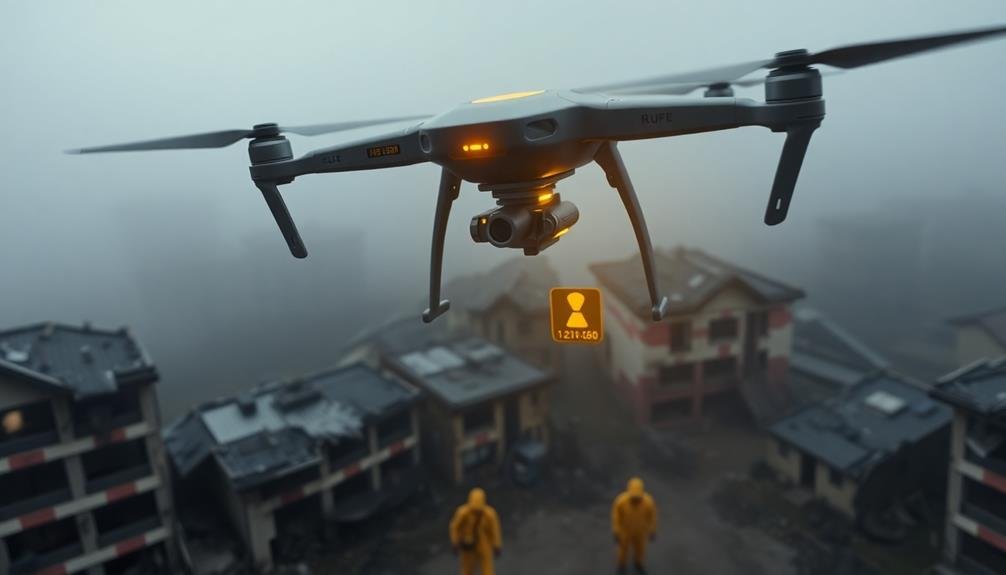
Leave a Reply